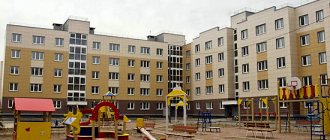Is it possible to register a person without the right of residence?
According to the Housing Code, the owner of the property retains the right to register not only relatives, but also strangers. What type of registration there will be depends on the agreement between the owner and the person being registered.
The following registration features are taken into account:
- on the territory of one residential area it is allowed to simultaneously issue permanent and temporary registration;
- It is unacceptable to register 1 type of registration in two apartments.
The registered person has a choice - to live in this apartment on a permanent basis or not to appear there at all. Registration without the right of residence is not a reason to count on part of the real estate.
The Civil and Housing Legislation does not contain the specific term “registration without the right of residence.”
In fact, the process of registering a person means that he must be provided with the right to reside. The owner of the property and the person registering discuss the conditions of registration and residence, spelling out this issue in the agreement.
Types of rental agreements
Prudent Russian legislators have long distinguished between several types of relationships between the landlord and the tenant. Chapters 34 and 35 of the Civil Code of the Russian Federation indicate when living space passes into the use of a legal entity - this is rent, and into the hands of an individual - this is rental.
Lease contract
Companies delight real estate “owners” with stable solvency and the potential to recover losses in the future. However, the representative office of the legal entity will not be able to occupy the living space, therefore, most likely, the housing stock will be re-let. In such a situation, an agreement for renting out an apartment must definitely be concluded - as insurance against penalties and running around with the tax authorities.
Lease agreement
Only employment relationships are possible between individuals, where one party acts as a landlord and the other as an employer. To simplify the picture, we will assume that hiring and renting are equivalent concepts.
Features of a short-term rental agreement
Hire for up to 12 months. A tenant who has signed a rental agreement between individuals has slightly limited rights.
Here are the ones:
- There is no privilege when prolonging the contract for the next term.
- You cannot invite other temporary residents to move in and live.
- There is no right to sublet.
- You cannot challenge the termination of a contract in court.
Actually, the daily apartment rental agreement itself can be downloaded here.
Features of a long-term rental agreement
A long-term residential lease agreement (1-5 years) is attractive due to relaxed conditions for the tenant. He can easily enter several residents into the form, as well as discuss the possibility of temporarily moving in “guests”.
Important
The area of the rented apartment is small, and with the potential move-in of temporary residents, the area norm per person will be violated? Move-in is considered unacceptable! The provisions on the above norm are contained in the Housing Code of the Russian Federation (Article 50).
A long-term employer also has privileges. This is a pre-emptive right to renew the employment transaction for a new term. The bottom line is this: the landlord, 90 days before the date when the contract for renting out an apartment to tenants becomes invalid, warns the tenants and offers to extend the relationship. When the “owner” does not show up on time, the lease agreement is legally extended for the next 5 years.
The most problematic part here is the termination of the relationship at the request of the landlord. A housing rental agreement between individuals, the form of which is available here, can only be terminated by a court decision.
Causes:
- non-payments within six months;
- damage to living space and objects;
- problems with neighbors;
- use of the apartment for any purpose other than residence.
Sublease agreement
All of the above applies to privatized apartments. But what should those whose housing has not gone through this process do? Is it possible to rent out non-privatized property? Yes. Under a special sublease agreement, with the consent of the owner (government institution, municipality). Leave the paperwork to qualified real estate lawyers.
What does the law say?
When planning to register a relative or a stranger without the right of residence, you should remember some nuances.
The legislation does not mention such registration - it is simply not provided for . The registration note will not contain any information. However, when concluding an agreement, you should not break the laws.
If 1 apartment owner (and there are several of them) accepts the procedure, then the rest give him notarized powers of attorney. Such registration is considered fictitious, and a fine is paid for it.
How to register a child at the place of registration of the mother? Find out in the article.
Rights of the registered person
Expert opinion
Makarov Igor Tarasovich
Legal consultant with 8 years of experience. Specialization: criminal law. Extensive experience in document examination.
In essence, this is the same registration as permanent registration. The list of rights that a registered person has depends on the type of registration. In the case of a temporary one, they are practically absent, except for the possibility of using social guarantees.
With permanent residence, you have the right to use all services necessary for your stay.
If a person is registered but does not live in this house or apartment, then he is not required to pay utility bills. But if this is not specified in the contract.
Flaws
The legal registration of a person without the right to reside is regulated by a special agreement. It makes it possible to exclude any claims to shared ownership of this residential area.
The procedure also has negative aspects:
- in the case of voluntary deportation, a person can only be evicted through the courts;
- if a person is registered at an address, he has the right to register his child (under 18 years of age) without asking permission from the property owner;
- The child has no property rights, but it will be difficult to sign him out;
- if there are family ties with such registration, then the registered citizen is considered a family member;
- It will take a lot of time to evict (even at your own request).
In accordance with the agreement, the person is registered at the specified address, but the passport is not stamped.
Who has the right to receive housing under a social tenancy agreement?
- Persons who have received group I or II disability;
- Disabled people who became disabled as a result of the Chernobyl precedent or liquidators of the consequences of emergency situations equivalent to it;
- Veterans of the Great Patriotic War;
- Citizens who lost their housing as a result of disasters or natural disasters;
- The corresponding category of citizens who need special living conditions due to health reasons;
- Certain categories of military personnel who were injured as a result of participation in military (other professional) activities.
This list of persons entitled to priority provision of housing is approved by legislative acts of the Russian Federation.
The standards for benefits for receiving residential premises from the municipality are determined in the light of regional regulations. However, certain categories of those in need of housing and those entitled to benefits are unified for all subjects of the Russian Federation. These include:
- Low-income and large families who do not have their own housing;
- Residents of municipal buildings subject to demolition;
- Residents of emergency housing, recognized as such by the relevant commission, which is confirmed by a special act.
By decision of the municipality, the housing occupied by your family can be transferred to the status of a non-residential property. (see) When seizing housing in accordance with this precedent, the administration is obliged to provide you with housing that meets the standards for each family member.
Queues to expand living space seem completely natural. But in the administrative departments of housing property managers there are other preferential queues. They are designed for those who have surplus residential premises and want to exchange their existing housing for another apartment with a smaller area. If you have similar plans, instead of extra (in accordance with the standards) meters, you can request housing of a smaller area, but with other advantages:
- More prestigious area;
- Desired number of floors;
- Newer house.
Most likely, the organizers of this type of activity will meet you halfway, because in any case, it is beneficial for them to reach a compromise with you. When submitting an application to be placed on a queue of this type, legalize all your wishes and consider all the options offered to you by the municipality.
Agreement
Before making a decision about registering a relative or a stranger in your own apartment or house, you need to specifically establish their rights in relation to housing. This can be done in the contract. There is no clearly established form of the document.
When drawing up an agreement, the homeowner takes into account his own wishes and conditions, and also provides for various ways to develop such relationships.
In the agreement, indicate:
- type of registration;
- indicate that the person registering does not have the right to reside or encroach on real estate;
- how long the agreement is valid;
- whether the parties are related;
- what are the grounds for termination of the contract;
- whether the registered citizen participates in paying utility bills.
The agreement is drawn up in a simple form; it does not need to be certified by a notary. Any conditions may be specified in the document.
Notarization is not necessary, but it can be done so that the agreement serves as strong evidence in case of litigation.
Necessary documents for registration
To obtain a social tenancy agreement, you need to prepare a whole set of documents. The applicants are residents of Moscow who received housing under an order from executive authorities. The list of papers includes:
- Application for the provision of services;
- Identity documents of all persons living in the premises;
- A single housing document or other certificates confirming residence in a specific territory;
- Extract from the house register;
- A copy of the apartment’s personal account;
- A warrant or order giving the right to move into the premises.
Additionally, certificates of birth, death, marriage registration, confirming family relationships may be required. The authorized body will request them independently. If the application is not made by the employer, you must submit a power of attorney, duly executed. The contract is issued within 10 days.
In 2020, the Moscow Housing Department is in charge of concluding social rental agreements for residential premises. This is where Muscovites need to contact to draw up an agreement and receive a duplicate in case of loss. The Department building is located in the very center at the address: Gazetny Lane, 1/12. Within walking distance are Okhotny Ryad metro station and Alexandrovsky Garden.
If there is no warrant, or the municipality refuses to issue a contract and provide housing for rent, you must go to court. Here a civil lawsuit is filed, in which the Housing Department is the defendant, and the necessary documents are attached. The court reviews the documents and issues an order to eliminate the violations of your rights.
It is not uncommon for a family to live in an apartment for a long time, but officials refuse to issue a rental agreement. The solution to this problem is similar: you need to go to court.
How to apply
This registration is similar to the regular registration process.
You must come to the passport office together with the owner of the property and provide the following documents:
- passport (or other identification document) of all participants;
- statement;
- a statement from all property owners that they agree to the registration of a new tenant;
- certificates of ownership of the apartment.
The algorithm of actions is as follows:
- Collect documentation.
- Provide them to the passport office employee along with the application.
- Both parties should come to the organization.
- Register the fact of submission of documents.
- Wait up to 10 days.
Everything about where to get a social tenancy agreement for residential premises and related documents
- a certificate-application that will be signed by all interested family members who plan to live in the apartment together with the main tenant.
- Documents that can confirm the relationship of the people who signed the application itself.
- Income certificates for the last two years for each applicant.
- Property information.
- An extract from the house register, which indicates that the applicant has been living in the state for the last ten years.
Of course, not every person can count on such an apartment. Housing space is provided to those who need to improve their current living conditions, as provided for in the housing provision standards. From our material you will learn how to conclude a social contract. renting housing and where to get it when you need it.
Interesting: Transfer of money to the Federal Tax Service for providing an extract from the Unified State Register of Entry
Documents required for registration
Like any other action with real estate, registration of a person requires a certain list of documentation.
- passport of the employer and the person registering;
- lease agreement (or other document of ownership);
- a statement from everyone living in the apartment;
- departure slip;
- extract from the house register and personal account.
In addition to consent, all residents will also be required to coordinate registration with the landlord - an employee who represents local authorities.
To register a child, you need to collect the following package of documentation:
- parents' passports;
- baby's birth certificate;
- Marriage certificate;
- extract from personal account;
- an extract from the house register;
- Statement from the child's mother and father.
Where to get a social rental agreement
- it is a housing decision;
- extracts from Rosreestr confirming the lack of housing ownership;
- an extract from the house register regarding registration at the place of residence;
- documents confirming the grounds: medical report on the presence of a chronic disease or disability group, documents confirming participation in the Second World War, liquidation of a radiation disaster, service during military operations in the territory of another state, etc.
To conclude an agreement, you need to contact the administration of your municipality. They will tell you the right department. This department does not have a single name and is called differently in each locality. It is also possible to apply through a multifunctional center for the provision of state and municipal services.
How much does it cost?
It should be remembered that the registration process is free - no state fee is paid. There is a nuance to this. Not every person has a relative who agrees to register with him. A stranger charges for this.
Such services cost from 20 to 150 thousand rubles per year.
Expert opinion
Makarov Igor Tarasovich
Legal consultant with 8 years of experience. Specialization: criminal law. Extensive experience in document examination.
Permanent type of registration without ownership rights
Citizens who do not have their own apartment are forced to face the problem of permanent registration. Not every homeowner will want to register a stranger in their home. This reluctance is explained by the presence of problems in the future when it will be necessary to dispose of the property.
The registered person will not have the right to dispose of the living space, and she has no right to claim a share of this apartment . If a person does not want to be discharged voluntarily, this can only be done through the court.
A citizen has the right to register his minor child without the consent of the owner. But he will not have any rights to this housing.
Evicting a child will be even more difficult. Even the court is not always on the applicant’s side.
Lawyers recommend 2 solutions - not to put a mark in the passport or to draw up an agreement.
Social tenancy agreement: where to get it, how to conclude it and what rights it gives
If the tenant turns out to be a persistent defaulter, he can be evicted by decision of the municipality. In this case, he loses all rights to reside in this premises and to register in it. The eviction procedure can also be initiated based on complaints from neighbors if the tenant constantly violates the order.
All of the listed categories of citizens have the right to apply to the housing department of the municipality. Their appeals will be considered, and orders for the use of residential premises will be provided on a first-come, first-served basis. The right to residence is granted from the moment the warrant is received, but to secure this right and subsequent privatization of the property, it is necessary to draw up a social tenancy agreement.
Temporary registration without the right to living space
If you need to register for a certain period, a temporary registration is issued. The period of registration in this case is limited. In addition, the registered person will not have any rights to the property. For greater protection of real estate, an agreement is also drawn up. The minimum period of registration is 1 month, the maximum is 5 years.
It can be extended an unlimited number of times.
Even if a relative is registered in the apartment, this does not give him the right to dispose of the property. To avoid unpleasant situations, it is better to immediately draw up an agreement in which the fact of the absence of rights to the apartment is recorded.
Is it possible to register in SNT? Read in the article.
How much does a Schengen visa cost? See here.
How to compose it correctly?
Before signing an agreement, you must check whether the landlord has rights to the apartment (purchase and sale agreement, privatization, etc.). The contract itself specifies these documents as the basis for renting out the apartment.
If the housing is in shared ownership, the consent of everyone who has permanent registration in the apartment will be required . It must be notarized if they do not temporarily live in the apartment.
To draw up a contract you will need:
- complete information about the apartment taken from title documents;
- passport data of residents and property owner;
- information about the shortcomings in the apartment (if any, they must be indicated);
- reached agreement on hiring terms and price.
After studying sample contracts on the Internet, you can print out the finished form and simply fill it out. You can also type the entire text again and supplement it with your own paragraphs and sections. If housing was selected with the help of a realtor, then the finished form will be provided to you absolutely free .
Before signing an agreement, especially for a long term, you need to study your rights and obligations and discuss all controversial issues. Residents must understand the total amount due, taking into account the costs of utilities and other payments, as well as a deposit for the owner.
The landlord must also be sure that in the event of non-payment, the tenants will quickly move out and not stay in the apartment as long as they want.
The issue of temporary registration (registration) of minor residents may also be controversial . It is better to discuss this topic in advance so as not to have to resolve the issue with the extract in court in the future. Formally, residents have the right not to consult the apartment owner on this issue at all. Another thing is how beneficial this is for the owner, because a minor can be discharged early only if there is normal housing for him no worse than the previous one.
In order to correctly fill out the contract, it is also necessary to include the following points:
- In addition to the essential terms, it is important to reflect in the contract all points related to:
- control by the owner over the safety of property;
- options for behavior in case of non-payment, damage to things or repairs in the apartment;
- early termination of the transaction.
- If other residents will live in the residential premises together with the tenant, then information about them must be included in the contract.
- Insurance against sudden increases in rental prices is also important for tenants. It can be stated that increases are possible no more than once a year.
- It is necessary to provide for a procedure for unilateral termination of the agreement. For example, in case of non-payment or significant damage to property in the apartment. If residents decide to move out, they are required to give at least 1-3 months notice.
If the owner of the apartment is afraid of the sudden disappearance of the tenants, then you can hedge your bets by establishing in the contract a three-month warning rule about moving out . If this is not done, the owner has the right to demand monetary compensation for the same period as lost profits.
Watch a video about filling out a rental agreement for residential premises:
Rights and obligations of the parties
The standard agreement provides for the rights and obligations of the apartment owner and the tenant. The landlord rents out housing, and the tenant is obliged to accept it and pay on time in accordance with Art. 676 Civil Code of the Russian Federation.
Employer
Residents have the right to use the apartment only for residential purposes (Article 678 of the Civil Code of the Russian Federation). Repairs can only be made with the consent of the apartment owner .
Residents are required to:
- Make all payments under the agreement, including utility bills.
- Carry out minor routine repairs in the event of damage to property.
- The responsibility also includes ensuring the safety of the apartment in the proper form in which it was received.
- Allow the apartment owner to enter the residential premises for the purpose of inspection.
- Return it in the same condition in which it was received.
- Pay bills on departure date.
- Notify the owner about theft, fire, flooding.
- Coordinate the replacement of doors and installation of alarms.
- Warn about eviction, invite strangers to stay.
To move in children, the consent of the apartment owner is not required, but for adults there is no such rule, so the tenant is obliged to inform the apartment owner about all persons who will live in the apartment.
Residents of rented premises also have certain rights:
- the right to use living space and temporary registration at the apartment address;
- pre-emptive right to extend the contract;
- sublease housing (with the consent of the owner).
Owner
The owner of the apartment is obliged:
- Providing accommodation for living in a timely manner after concluding a contract.
- Ensure the use of public services.
- Carry out major repairs (Article 681 of the Civil Code of the Russian Federation), repair of communications (sewage, water supply systems) if necessary, if it was not the fault of the residents.
As for rights, the apartment owner can:
- terminate the contract early in case of violation of its terms;
- increase the amount of payment within the agreed time frame;
- control the safety of your property;
- periodically carry out repairs at your own expense in agreement with the tenant.
The contract can stipulate, for example, that once a month the owner of the property has the right to come in and check its condition. The death of the apartment owner does not terminate the tenancy agreement . All rights and obligations under the agreement pass to its legal heirs.
For how long can I conclude?
The terms of employment are stipulated by agreement. The rental agreement for residential premises is concluded for a period not exceeding five years. If the contract does not specify a period, then the contract is considered concluded for this period. Article 683 of the Civil Code of the Russian Federation tells us this.
Temporary registration in Russia for its citizens is also 5 years, and for foreigners no more than a year. Registration is required if tenants have checked out from another location . It is carried out at the request of the apartment owner, taking into account the consent of persons with permanent registration or other shared owners.
TIP : To make changes to the contract, you can draw up an additional agreement in writing indicating new terms and conditions. If the contract has expired and the tenants continue to live with the consent of the owner, then it is considered renewed automatically.
Responsibility for fictitious registration
The violator faces criminal liability. It is regulated by Article 322.2 of the Criminal Code.
The fine in this case reaches 500 thousand rubles or forced labor for up to 3 years.
Thus, registering a person and not giving him any rights to live in an apartment is possible only in theory. By going to court, citizens defend their own right to live at their registration address. Otherwise, it will be considered fictitious. And this threatens the owner of the property with liability.
The contract is a binding document . It guarantees that the registered person does not have any rights regarding the apartment (house).
Even if it is a relative or a good friend, it is better to draw up an agreement. For it to have legal force, it must be certified by a notary.
The registration of people without property rights poses no threat to the owner of the property. Even if it is registration on a permanent basis.
- Due to frequent changes in legislation, information sometimes becomes outdated faster than we can update it on the website.
- All cases are very individual and depend on many factors. Basic information does not guarantee a solution to your specific problems.
That's why FREE expert consultants work for you around the clock!
- via the form (below), or via online chat
- Call the hotline:
APPLICATIONS AND CALLS ARE ACCEPTED 24/7 and 7 days a week.
The presence of registration presupposes residence at this particular address, and an agreement on registration without the right of residence actually documents a fictitious registration.
Citizens of the Russian Federation have the right to freedom of movement and choice of place of residence; the only requirement for them is to declare their new location.
Registration does not affect ownership, so owners should not worry, but to protect themselves, draw up a bilateral agreement on the right to use their residential premises.
Hello! We have three children, the father wants to register an apartment for his youngest son... Can I apply for my part of the apartment without having a residence permit?
If you want to get advice, then write not in the comments, but in the online consultant or through the form above.
© Apartment 3. Free legal consultation: Moscow time, St. Petersburg.
How to draw up a rental agreement for residential premises: form and rules for filling out
After concluding a residential rental agreement, the parties do not need to register this document with various government authorities and notary offices.
The agreement is drawn up on paper; it must contain comprehensive information about the transaction being concluded, after which it is signed by each of the parties. A residential lease agreement acquires legal force if it includes the clause “conditions on the subject of the agreement.” In this case, the subject of the contract will be the residential premises being leased. That is why the following information must be included in this paragraph:
- exact address and contact details of the parties;
- comprehensive information about the rented residential premises;
- address of the property that is the subject of the agreement;
- total and living area of the residential premises;
- number of rooms;
- general condition of the property, etc.
If no mutual understanding has been reached between the parties, the residential lease agreement will be declared invalid and this document will have no legal force.
The document regulates the relationship between the landlord and the tenant, recording all the essential details of the transaction - from the description of the residential premises to the rental price and payment terms.
Article 673 of civil legislation defines the object of the contract as an isolated premises that meets living conditions, and can be presented in the form of a house, apartment, or part thereof.
Standards of habitability are determined by the provisions of housing legislation, and according to Article 290, the tenant has the right to use the property of the house, subject to living in an apartment building.
From a legal point of view, it is important to distinguish between a social rental agreement and a commercial rental agreement, including daily rental:
- Under social rent, it is possible to provide housing from a special social fund if it is determined that a citizen permanently residing in a certain locality needs improved conditions and is registered accordingly. The authorized state body must make a decision to provide the specified housing on the basis of a warrant. In fact, a social tenancy agreement is not, in the full sense, a document establishing an agreement between the landlord and the tenant, because all clauses of the agreement, obligations, rights, procedures for use and termination are determined without the participation of the citizens themselves, on the basis of federal and regional regulations.
- Commercial short-term hiring is formalized by an agreement, which is a full-fledged civil law document, by which the parties independently determine the terms of cooperation and the main parameters of the transaction. The main points that must be established by the contract are: period of validity, conditions of transfer for use, payment, obligations, etc.
The object transferred from the owner to the tenant can be: an apartment, a room, a house. The identification features and characteristics of the object must be clearly described in the clauses of the agreement.
Read about the room rental agreement here.
A short-term rental agreement has a number of characteristic features that distinguish it from other types of legally significant documents in relation to real estate:
- There is no need to officially register the fact of transfer of housing for use to other persons.
- No notarization is required, which means there are no additional registration costs.
- The duration of the agreement has limitations and is established taking into account the will of the owner and his right not to renew the document.
- Persons for whose use the housing has been transferred are prohibited from assigning the right of residence to a third party.
- Violation of the provisions regarding the tenant's obligations serves as a legal basis for early termination of the agreement without providing additional time to find a new place of residence and organize the move.
Thus, a short-term rental agreement confirms on paper the oral agreements that have arisen and regulates further relationships between the owner of the property and the person to whom the housing was transferred on a paid basis.
The next important point that must be indicated in the document is the lease term. Usually the contract is concluded for a year and then extended.
Preparation of papers
The basic package of documentation provided for drawing up a lease agreement for non-residential premises depends on who acts as the parties - individuals or legal entities. So, for such a transaction, individuals need a passport, a tax code, and an individual entrepreneur (IP) must additionally provide a certificate of registration.
Drawing up a lease agreement
The lease agreement is a standard document and cannot be drawn up in any form. When forming the provisions of this document, the interests of both parties are taken into account, as well as the economic features of the transaction and other details.
This document states:
- legal status of the parties;
- landlord tax system;
- lease term and the possibility of its automatic extension;
- the need for registration;
- possibility of rent adjustment;
- the need for a guarantee payment;
- procedure for paying utility bills;
- the right of the parties to sublease property;
- the procedure for compensation of expenses for improving the condition of the premises by the owner;
- insurance;
- rights of third parties;
- risks;
- presence of damaged property;
- restrictions on the use of property;
- responsibility of the parties in emergency situations;
- other.
When drawing up a lease agreement for non-residential premises, all of the above details are discussed in writing. In the future, amendments may be made to the agreement, but only with mutual consent of the parties. Therefore, it is advisable to provide for everything when drawing up the text of the main agreement.
About
Download registration agreement form without ownership rights
This entails a requirement, through a judicial authority, for parents to register them at the address of their children’s residence.
A properly drafted agreement will minimize the risk of falling for such scammers.
Moreover, it is recommended to draw up an agreement with a validity period of 6 months or less, since, based on the legislation of the Russian Federation, temporary registration does not provide the right to transfer property to other ownership.
Registration without the right of residence, do you need to pay utilities?
A property owner who has decided to register other citizens in his home must understand that this automatically entails an increase in utility bills.
At the same time, the newly registered citizen does not have to pay for utilities.
This provision is regulated by current legislation and at the same time contains many subtleties and nuances. In our country, a fairly common practice is registration without property rights to housing. There will be some peculiarities here that you need to know.
Social housing rental. Design options
Social rental housing is still in demand among part of the population who do not have the opportunity (even temporarily) to purchase housing as their own and, at the same time, have the right to social rent. This is important because, without a doubt, housing is a necessity of life.
The majority of those in need of housing consider their only option to be renting housing from an individual. Simply from the owner of the apartment. However, for part of the population this is not the only option, since government agencies and municipalities may own vacant housing.
Housing owned by the state or municipalities may, under certain conditions, be transferred to social rent after concluding a special social tenancy agreement. What is important is that housing received under such an agreement, again, under certain conditions, can be privatized, that is, transferred into ownership.
Legally, social rent is the transfer of state or municipal housing for use by citizens under a special agreement.
For reference. The social tenancy agreement deals with housing that falls under the definition of “social housing”. This is residential space provided free of charge for indefinite residence, but for the entire duration of the contract it is the property of the municipality or state.
Such an agreement is concluded for an indefinite period. An additional bonus for citizens who have never participated in the privatization program will be the right to privatize the housing they received. As a result, it will be possible to dispose of this property at your own discretion.
Please note that all the details of the provision of social housing are defined in Articles 7 and 8 of the Housing Code of the Russian Federation, which must be referred to if your task is to draw up a social tenancy agreement.
Who can get social housing
The most vulnerable segments of the population can enter into a social rental agreement, but this requires certain grounds and conditions.
Attention! To be able to draw up a social tenancy agreement, two conditions are required:
- the social security department must recognize your family as low-income;
- your family must be officially identified as needing accommodation.
The following grounds are specified in the legislation:
- citizens and members of their families who have not previously participated in the social housing rental program;
- citizens have housing, but it is less than the established norm, based on the number of family members;
- the residential premises are recognized as unfit for habitation;
- one of the family members is sick and his illness poses a danger to others.
The following people can take advantage of the preferential queue for social housing:
- minor children, disabled children, as well as those left without parental care (orphans);
- graduates of orphanages and foster families;
- victims of natural disasters;
- forced migrants;
- residents of emergency premises being prepared for demolition;
- veterans of the Great Patriotic War and labor, as well as combatants;
- liquidators of the Chernobyl accident;
- disabled people, with a non-working group.
There are also special conditions specifying social rent:
- applicants for social housing must have Russian citizenship;
- it is necessary to have a residence permit for ten years in the locality where it is intended to draw up a social tenancy agreement;
- the applicant during the last five years should not have made any transactions with real estate that resulted in a deterioration of its status, for example, exchange, sale, etc.
How to get social housing
Low-income people have a chance to get social housing, but first they must obtain the status of a low-income family in a social welfare institution in their area.
To complete this procedure, collect and provide the following package of documents:
- copies of passports,
- for children birth certificates,
- TIN,
- marriage certificates.
- for working citizens, certificate 2-NDFL, for the last two calendar years.
- for those who are officially unemployed: a certificate of the amount of unemployment benefits.
- for students, a certificate of the amount of the scholarship.
- for pensioners, certificate of pension amount. Extract from the Unified State Register. If you have your own home: a certificate of ownership, a BTI certificate with an assessment of the value of the property.
It is not necessary to notarize copies of documents; it is enough to provide the social security specialist with the originals of all attached documents.
Risks:
What follows is either a refusal to assign the status of a low-income family or the family is registered. What matters here is the family’s total income and the value of its real estate.
The next step is to contact the housing department of the municipal administration of your locality or the MFC.
How to get a social tenancy agreement
List of documents and procedure:
- application for social housing;
- certificate of family composition (valid for ten days);
- decision of the housing commission that a citizen needs housing;
- conclusion on the unsuitability of housing for further residence: (demolition, recognition as unsafe);
- extract from the house register (valid for one month);
- extract from the citizen’s personal account;
- confirmation that other family members do not have any other housing (valid for an average of two weeks);
- medical certificates confirming illness or disability (copy);
- documents confirming participation: in the military operations of the Second World War, in the liquidation of the Chernobyl disaster (copy);
- certificate of participation in hostilities (copy).
When submitting an application and accompanying documents, ask an administration specialist or MFC for a receipt. The specialist must indicate in the receipt his position, full name, date of admission and date of announcement of the decision, sign and seal.
After one month from the date of submission, the application must be considered. If approved, a social rental agreement for residential premises is concluded.
If it is refused, please clarify the reason for the refusal; the reason for the refusal may be the incorrect execution of some documents, then you need to try to eliminate all violations and resubmit.
In any case, receive a certified copy of the decision.
Possible reasons for deregistration for social housing:
- the citizen himself submitted an application to remove him from the register;
- the family has lost its low-income status (income has increased);
- the citizen left for permanent residence outside the municipality;
- funds were received from the budget for the construction or purchase of housing;
- documents provided that do not correspond to reality;
- the citizen refused the proposed options three times;
- the family has decreased in size.
Read also: – social housing can also be privatized
The subject of this agreement will be a separate living space, that is, isolated.
Attention! An isolated room, but not necessarily an apartment. The main thing is that the room is separate. Non-isolated premises, as well as common areas, cannot be provided for social rent.
Let us remind you that according to Art. 16 of the Housing Code of the Russian Federation, the following are considered residential premises:
- residential building or part thereof;
- apartment or part thereof;
- room.
For example, you can use a social rental agreement . The contract, in principle, is working, but all clauses should be carefully reviewed in order to adapt to your conditions. Changes are allowed, but no point should worsen the situation of the employer.
The contract must include two parties: “Tenant” - a citizen and “Lender” - the municipality. Both parties sign the agreement and from that moment it comes into legal force.
The text of the contract specifies in detail what kind of housing is provided to the citizen for rent (apartment, house, apartment in a two-flat building, etc.). The address of the property is indicated: (region, district, locality, street, house number), in apartment buildings (building and floor).
The exact footage of the usable and total area of the room is prescribed. Sometimes, when the premises are furnished, a transfer and acceptance certificate is attached to the contract, which indicates all interior items, furniture, household appliances, etc. But more often, empty living space is rented out.
Please note that the clauses of the agreement may contain a definition of the possibility of termination of the agreement at the initiative of the “Lenter”. This is an important point, since inattention when reading the contract can result in forced eviction if this clause of the contract is not fulfilled.
As a rule, the true reasons for termination of the contract may be violations committed by the tenant, for example, using the housing for other purposes (cluttering, which entails the creation of a fire hazard, the proliferation of all kinds of insects and rodents). Violation of silence, petty hooliganism. Delay in payment for utilities and rent, more than six months.
Attention! The social tenancy agreement is terminated automatically in the event of the death of the main employer who signed the agreement.
The norm for the allocated area based on square meters, meters per family member is indicated in Art. 50 Housing Code of the Russian Federation. This norm can be reduced, but not by more than 10%. The parties, by agreement, may introduce important conditions into the contract. After signing the contract, civil legal relations arise between the parties, which in itself entails certain obligations between the parties.
Important! You should check that the terms of the contract are not specified. According to Article 60 of the Housing Code, it must be of unlimited duration.
The agreement is concluded in two copies, one for each party.
Rights and obligations of the parties
For the employer, the rights and obligations are specified in Article 67 of the Housing Code of the Russian Federation.
Resident's responsibilities:
- use housing strictly for its intended purpose and treat it with care;
- carry out routine repairs in a timely manner,
- take care of the entrusted property located on the premises (if any).
- Pay rent and utility bills on time.
Resident's rights:
- sublease housing (to third parties).
- demand major repairs and provision of utilities.
- temporarily allow other persons to stay with you,
- if you wish, apply for an exchange of housing for another that is municipally owned.
Important! If the terms of the contract are not properly fulfilled, the tenant has the right to demand a reduction in rent, as well as compensation for losses caused and compensation for moral damage.
To resolve the issue, write a complaint to the landlord, stating the essence of your requirements. Be sure to send by registered mail with notification. At the end of the document, indicate the address where the response should be sent.
If the conflict is not resolved, you can file a claim in court for compensation for moral damage, but in this case it is necessary to prove to the court what kind of moral damage the applicant received due to the action or inaction of the defendant.
According to Art. 12 of the Civil Code of the Russian Federation, such a violation of civil rights has no statute of limitations.
In the statement of claim, you can simultaneously indicate property damage. But you need to remember that the statute of limitations here is three years.
Please attach to the statement of claim: supporting documents, a copy of your passport and a receipt for payment of the state fee. If the claim simultaneously involves property and non-property claims, the state duty will be calculated for each separately.
But don’t be upset - in the text of the statement of claim, after the word I ASK you, in addition to the main requirements, you can write down the clause: “To collect from the defendant the costs of paying the state fee in the amount of (amount). Recover the costs of legal services: (consultation, lawyer, representation in court, etc.), in the amount.”
If the claim is satisfied, your costs will be compensated. Don't forget to include a receipt confirming your attorney's fees.
For reference. Depending on the amount of the claim, the claim will be considered by the District Court (over 1 million rubles) or the World Court (up to 1 million rubles).
For the landlord, the rights and obligations are specified in Article 65 of the Housing Code of the Russian Federation.
Responsibilities of the “Lenter”:
- transfer for use a legally clean premises, that is, free from obligations to third parties.
- provide quality public services,
- carry out major repairs in a timely manner.
Rights of the “Lenter”:
- demand rent and utility payments from the tenant.
- compensate for damage caused by the tenant as a result of lost or damaged property,
- terminate the contract if the employer fails to fulfill its obligations.
Source: https://xranitelochaga.ru/objekty/kvartira/socialnyj-najm.html
General provisions
Expert opinion
Makarov Igor Tarasovich
Legal consultant with 8 years of experience. Specialization: criminal law. Extensive experience in document examination.
Not every citizen has his own living space. But at the same time, he simply needs to have a place of residence and official registration. From here it should be understood that registration can have two options:
Both of these options are regulated by law and each have their own characteristics. If we turn to the law, it will become clear that each type of registration is a method of fixing citizens in a specific place.









